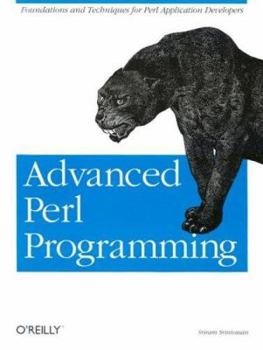Advanced Perl Programming
Select Format
Select Condition 
Book Overview
So you've learned Perl, but you're getting frustrated. Perhaps you've taken on a larger project than the ones you're used to. Or you want to add a user interface or a networking component. Or you need... This description may be from another edition of this product.
Format:Paperback
Language:English
ISBN:1565922204
ISBN13:9781565922204
Release Date:August 1997
Publisher:O'Reilly Media
Length:432 Pages
Weight:1.56 lbs.
Dimensions:0.9" x 7.1" x 9.2"
Customer Reviews
5 ratings
Strange, strange book...
Published by Thriftbooks.com User , 22 years ago
I am unable to categorize this book. As the title says, this is about advanced Perl programming, but chapter 1-9 really belongs in "Programming Perl" (but are totally missing from it), and should really not be considered advanced (on the other hand, quite elementary, but since they appear nowhere else, you should probably consider this book a must read, if you are serious about Perl).The rest of the book is pretty random, covering various topics the author thought was neat, and wanted to write about. This is ranging from trivial use of CPAN libraries (Tk), to trivial Perl but involving knowledge from other disciplines (networking), to actual useful advanced Perl programming (persistence, template-driven code-generation, and the C programming interface). This part of the book is also highly recommended (and in fact the reason I bought it), but should have been much longer.
Excellent Resource
Published by Thriftbooks.com User , 25 years ago
O'Relly books are generally great sources and this one is no exception. I've been programming with Perl for CGI, NetAdmin, SysAdmin, and various data tasks for almost 4 years. Anybody who knows Unix will know a lot more by knowing Perl and advanced Perl takes you to the next level. Tell archie to stop whining and cop to his real name...
Great book for intermediate Perl programmer.
Published by Thriftbooks.com User , 25 years ago
Normally, I would not feel the need to review this book, had I not seen the review: "Why are there so many good reviews for this book?" by Eric Vogan (see above). I would like to add that it is a great book and that it has thought me a lot. Having mastered basic to intermmediate Perl, "Advanced Perl Programming" really took me further. But as the name says, this is "advanced" Perl programming, and not a beginner's book. So Eric, even though you are a C++ programmer, you have to go through the basics before you try to use this book. The Preface clearly says what you are expected to know before you start with this book. For beginning Perl programmers I would recommend the "Perl 5 by Example" and "Programming Perl", both of which are an excellent entry point to Perl. But for taking your studies further, "Advanced Perl Programming", among others, is a gold-mine.
At last!
Published by Thriftbooks.com User , 27 years ago
At last! Now the Perl "must read" list is complete: 1. Programming Perl by Wall, Christiansen & Schwartz. 2. Mastering Regular Expressions, by Friedl. 3. Advanced Perl Programming, by Srinivasan. Taken together, these three books are *THE* way to learn as much Perl as you want, or as little as you need. Just the right level of detail. There's some unavoidable duplication, but not enough to be bothersome. If you just want to reformat your C to look like perl, go ahead and get one of the many wordy but insubstantial "learn in n days" books. But if you want to master the truly remarkable "Swiss-Army Chainsaw" of programming languages, these are the books for you.
Beautifully readable and redolent with examples !
Published by Thriftbooks.com User , 27 years ago
I've been playing with Perl (where playing I guess is the operative word) for about 6 years now. That means I've read -- or tried to read -- what have been rated as some of the best books on Perl. But I've read them intermittently, as I do all technical works: a bit here, a bit there, pause a bit, try a bit of code, look up a chapter... etc. This book was different. Within 12 hours of getting it, I had read continuously through to the end of Chapter 7 (120+ pages), taking it all in voraciously. Somehow, this has picked up on every important cranny in the language I had skipped over as "too hard" or "too confusing" -- with all deference to Larry, Tom and Randal.. It hits the spot with examples just where I need them, and with concepts and analogies that clicked into place beautifully. If you know about pointers, but puzzle about refs and typeglobs and $$this and \$that and *somethingelse, if talk of aliases, closures, and variable suicide have made you feel inadequate... if the works of modules, objects and stuff like that still has you confused, this book is for you. The only problem: I used to think of myself as a tech writer... they still pay me for it. Now I just feel inadequate. But I'm learning.





